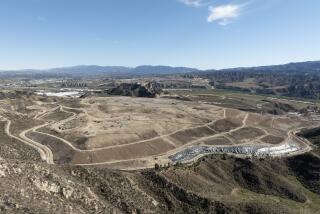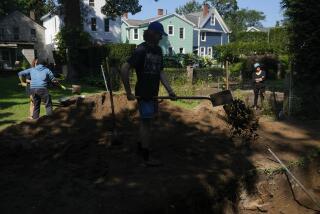Los Angeles Expected to Help Cemetery Dig Its Way Out of Financial Difficulty
- Share via
The City of Los Angeles is expected to provide $36,000 in temporary bailout money so the 130-year-old Wilmington Cemetery--closed June 19 after a deficit forced the layoff of employees--can resume normal operations.
The Wilmington Cemetery District board, which operates the graveyard near Banning Park, has proposed a special assessment in Wilmington to pay back the money and provide a permanent solution to the district’s financial problems.
The deficit came to light when the Los Angeles County auditor/controller froze the cemetery’s bank account in May because it was overdrawn by $21,428.
The Los Angeles City Council’s finance committee, acting on a motion by Wilmington-area Councilwoman Joan Milke Flores, this week approved a cash advance to the district to tide it over until it receives its property tax money in December. It is expected to be approved by the full council.
The county has temporarily waived repayment of the cemetery overdraft.
City Could Inherit Cemetery
“It is not a city cemetery and it is not a city problem, but we realize if it gets acute, it may well fall into our hands,” said Flores, referring to the fact that if the district dissolved itself because of the financial problems, Los Angeles would be required by state law to take it over because the cemetery is completely within the city.
“It we don’t take care of the situation, we will have a big problem,” Flores said.
The cemetery board at a special meeting last week called for the special assessment from owners of about 10,000 parcels within the district, which is generally bounded by the Harbor Freeway, Lomita Boulevard, Alameda Street and B Street.
The board is expected to take formal action Monday calling for the assessment and a public hearing will be held Aug. 3 at 7 p.m. at Banning Recreation Center. Bernie Evans, Flores’ deputy, said the assessment--which will appear on November tax bills if approved by the cemetery board--will not exceed $7 per parcel. Continuation of the assessment would require annual hearings.
Deputy County Counsel Helen Parker said the district is obligated to cover its overdrawn county account and repay Los Angeles for its loan and staff time in preparing for the special assessment. She said the board must have a public hearing but need not put the matter to a public vote.
Would Keep District Running
“The assessment would provide enough money to keep the district running as an independent entity,” she said.
County, city and district officials also have pledged to improve operations of the cemetery district, which has come under fire from some Wilmington residents who complained of poor maintenance and long delays in receiving deeds to cemetery property.
“The district has not conducted its business well and we are resentful,” one man said last week at a special board meeting attended by about 25 residents.
Parker, who is legal adviser to county cemetery districts, said at the meeting that the Wilmington district has received a “jolt” that will compel it to “do business better or others might want to be on the board.”
Dade Albright, board president, said the district has responded to complaints and has tried to keep the cemetery “reasonably clean,” but he added, “We got complacent; things have been running for many years without any hitches or problems.”
There are now three unpaid trustees appointed by the County Board of Supervisors and a fourth may be added. The board, which has held its meetings on an irregular basis, will set a specific meeting time and give public notice.
The overdraft was attributed to the difference between what the district--using money advanced by the county treasury--had spent by April and what it received from property taxes, cemetery operations and oil production royalties.
“They had cash to start the (fiscal) year, they came in with about $16,000,” said Clifford Mansfield, chief of the county’s accounting division. “But they ended up $21,000 in the hole.”
He said the overdraft--the first in the 29-year history of the district--was not discovered until April because of a county practice of letting taxing agencies that receive revenue in December and April borrow from the county treasury. He said this is designed to cover the “so-called dry period for taxing agencies.” As soon as the overdraft was discovered at the end of April, the cemetery district account was cut off, he said.
1,280 Protest Closure
As an indication of the strong feelings the cemetery issue has aroused in Wilmington, where many have relatives buried in the cemetery, 1,280 people have signed petitions protesting the closure, according to Ramona Bulick, who is 55 and said she was “born and raised” in a house across from the cemetery.
“What I want is to get the cemetery open again,” Bulick said in an interview. “We have history there, men from the Civil War, from the service. My father, mother and nieces are buried there.”
The graveyard is open only on Sundays.
The cemetery--said to be the oldest operating graveyard in the county--enjoyed its best days a century ago, according to local historians. Phineas Banning, the founder of Wilmington and an early developer of what became Los Angeles Harbor, was buried there in 1885, but his remains were later moved to Rosedale Cemetery in Los Angeles by his second wife. The remains of Banning’s first wife and five of his children remain in the cemetery.
Once Two Cemeteries
In private ownership for many years, the cemetery--actually two separate graveyards at one time, according to the district--fell into a state of disrepair and Wilmington voters in 1958 approved creation of the public cemetery district to operate it.
County and cemetery district officials--while agreeing that the financial woes are the result of declining property taxes and lagging cemetery revenue, particularly oil royalties--differ sharply on who is responsible and about warnings signals that trouble was brewing.
Cemetery officials contend that the county should provide the money needed based on the annual budget submitted to the auditor/controller, but the county asserts that the board has yet to understand the fundamental change in the county property tax system made after passage of the tax-cutting Proposition 13 in 1978, which initially cut tax money to the district by nearly two-thirds.
Cal Thomas, who has been the cemetery board’s accountant since 1962, said the deficit occurred because it did not get a sufficient tax allocation from the county to bridge the gap between district income and expenses. “We sent the budget in, but no one told us we weren’t going to get it,” he said.
Alerted to Crunch
He said the board knew “two or three years ago”--with verification by an outside accountant--that a financial crunch was coming because its two cushions, a reserve fund and oil revenues, were declining.
He said he talked to county officials about the growing problem--asking if the district was not entitled to an increase--but “got no answers.”
He said: “If you’re not going to get what’s in your budget, aren’t they (the county) supposed to tell you your budget is too high?”
But county accounting chief Mansfield said Thomas does not understand that the method of allocating property taxes to special districts changed with passage of Proposition 13 and taxes are no longer levied to meet specific budgets. “I don’t know where he’s been to tell this story at this late date,” he said.
1% County Tax
In the past, Mansfield said, budgets were submitted and a specific tax rate was set within a district to meet that budget. However, since 1978, all county taxing agencies have shared in the 1% county property tax, which is allocated based on the amount each was receiving in the three years before Proposition 13.
“Budgets are no longer important to tax-raising,” he said. “A district can set a budget, send us a copy, but there’s nothing we can do with it any more.”
Mansfield said the county explained the change to all taxing agencies after Proposition 13 passed. And last year, he said, the auditing division wrote a letter to Albright “which expressed concern for their dropping trend in fund balances.”
Mansfield described the county as the “banker” for the cemetery district, paying bills submitted by the district, not its financial regulator. “We did what we were supposed to do, kept the bank account,” he said. “We have no oversight powers. The board is totally in charge of that.”
Deputy County Counsel Parker agreed that the cemetery district is “supposed to run itself” and the county is not its money manager. “The district is in charge of its own money.”
She said that all districts, including the cemetery district, were informed in 1978 of the possible effects of Proposition 13. All such districts--which are established to provide such services as sanitation, mosquito abatement, libraries and parks--were hit hard by the new law “because it changed the property tax allocation, at the expense of districts heavily reliant on the property tax.”
A year ago, Parker continued, the cemetery district was notified that the reserves were falling behind expenditures.
“I’ll take my share of the blame,” said Albright of the cemetery board, conceding that he was not aware of the taxing method. But he also faulted the county.
“They should have seen this happening, and the minute we were behind on money, they should have let us know,” he said. “They paid our bills, they let us get this far in.”
He said that after the district knew it was slipping down a financial hill last year, it asked the county for help “but we never seemed to get any.”
Mansfield and Thomas gave these specifics on the financial decline of the district:
According to Mansfield, the district tax revenue in 1977-78, the year before passage of Proposition 13, was $35,000. It dropped to $13,000 the next year, and gradually climbed back to $20,000 for the 1986-87 fiscal year. The year-end cash balance was $92,000 in 1982-83 but had dipped to $39,000 in 1984-85 and was $16,000 in 1985-86.
According to Thomas, cemetery income--from such things as sale of graves, cemetery services in connection with burials and revenues from oil--fluctuated widely, reaching a high of $55,799 in 1981-82, with oil money accounting for $27,571 of that. It declined steadily to $39,121--including $13,605 in oil money--in 1985-86, the last year for which complete figures are available. Estimates for 1986-87, up through February, show an income of $23,000, with $3,500 from oil.
During this time, cemetery budgets over the last 10 years ranged from $42,985 to $101,000, according to Thomas. In 1986-87, it was an estimated $98,770.
Thomas said the biggest factor in dropping revenue has been the loss of oil money, which he said came with the sharp drop in the price of oil and a reduction in oil production in Wilmington.
Thomas said more than half the budget for the last fiscal year covered salaries for the three maintenance employees, who were let go with five weeks of salary still owed to them. Albright said they will eventually get their money.
Other major cemetery costs are for equipment, fertilizer and water, which Thomas said can be up to $1,500 a month in dry weather.
He said the district has tried to hold down expenses by not buying new equipment or raising employee salaries. “The board cut back as much as it could,” he said, adding that there is a point when you can’t cut any more.
When the grass is not green, he said, “you should hear the screaming.”
More to Read
Sign up for Essential California
The most important California stories and recommendations in your inbox every morning.
You may occasionally receive promotional content from the Los Angeles Times.













